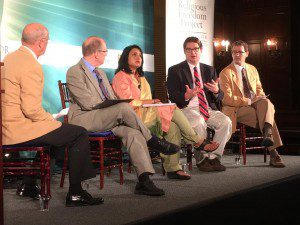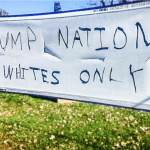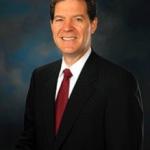Today, I’m taking a break from my usual research, teaching, and writing to attend a conference at Georgetown on religious freedom.
Here are some notes from a panel on religious freedom and human flourishing. These scholars discussed academic research that points to religious freedom playing a positive role in societies.
Byron Johnson, Baylor University (moderator)
Thomas Berg, University of St. Thomas
Rebecca Shah, Religious Freedom Project
Brad Wilcox, University of Virginia
Robert Woodberry, Baylor University

Rebecca Shah of the Religious Freedom Project has found that convert women in India are likelier to report sexual abuse — Religion gives them a feeling of worth and an expectation of dignity. She poses a provocative series of questions: What is the content of religious belief that directs future behavior? How do specific beliefs impact social phenomena? As a researcher, she has had to move beyond broad, simplistic demographic categories for religion. She finds more robust results when she has data on the specific content of religious beliefs. (I think there are clear parallels here to my writing on evangelicals.)
Bob Woodberry, a social scientist at Baylor University, has conducted research on Christian missionary work. He found that marginalized are most likely to convert, which in turn changes the dominant religious order. So mission groups not only bring faith (and arguably other social, economic, and political goods) to masses, but changes the behavior of the large or established majority churches. (See Guillermo Trejo’s 2009 article on the Catholic Church working with the poor more after Protestant missionaries came to Mexico.) Missions can shape societies through improved literacy, more book publishing, newspaper consumption, lower infant mortality, higher life expectancy etc. Not causal necessarily, but interesting to note.
Woodberry also notes that there are problems with causality and methodology: self-reporting is just “what I say about what I do.” But religious people live longer and recover from sickness more quickly. This has an economic benefit for society that people do not even think about.
Tom Berg of the University of St. Thomas is legal scholar and advocate in appellate courts and legislatures His role is as consumer of research on religious freedom, interpreting it for use in contemporary debates. Washington’s farewell address said that morality was quite essential for a good society. The framers did not believe government could inculcate virtue. Madison thought if government advanced religious institutions, it would corrupt them. This led to religious institutions promoting the common good in their own ways. Today’s conflicts often involve Roman Catholic or evangelical Protestant entities. John DiIulio says those communities figure most prominently in showering volunteer hours on members and non-members alike. They may promote vigorous to civic commitments and voluntarism but may depart from societal norms due to their unique religious character. They serve the broader society, but they are in a sense counter-cultural to dominant norms. Organizations that make counter-cultural demands tend to produce greater commitments in their members by reducing free riders, etc. What is is about Catholic and evangelical organizations that make them particularly vigorous in America? What are the dynamics that make for their vigor? Do they uniquely generate counter cultural practices that lead to conflict with law and society?
Berg also points out that, in terms of social stability, religious freedom could be very important. Muslims in the United States will feel more proud and secure about their country if they know their rights to live according to their faith is secure.
UVa sociologist Brad Wilcox has found that children (particularly disadvantaged) benefit from religious engagement. His research also finds that married couples who undertake religious devotion and participation together report higher marital satisfaction and are less likely to divorce. Again, these relationships are not necessarily causal and are difficult to quantify.
Wilcox says sometimes there is no effect, for example, between religious liberty and the health of marriage as an institution across the world. There is a positive association between religious attendance and the strength/quality of marriage. But this is not the same as saying religious freedom has a positive causal effect.












